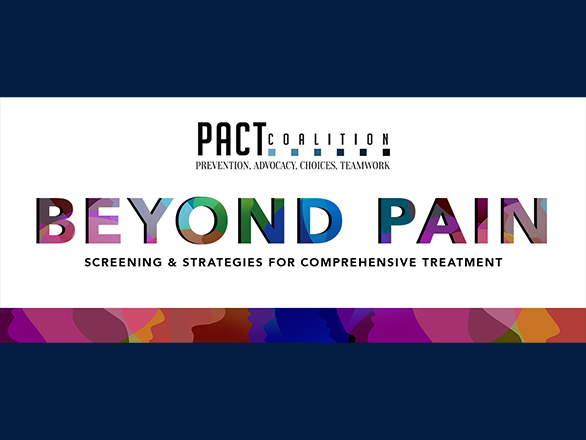
CME ON-DEMAND
Provides 2.00 hours of CE/CME credit for Part I and Part II

CME ON-DEMAND
Provides 2.00 hours of CE/CME credit for Part I and Part II
These two-hour enduring materials will cover two key approaches for addressing substance use and pain in healthcare and community settings.
Part one explores pain management, distinguishing between pain and suffering in clinical care. Attendees will learn a comprehensive approach integrating physical, emotional, and psychosocial aspects, along with the 2022 CDC Guidelines for Prescribing Opioids.
Part two will focus on SBIRT (Screening, Brief Intervention, and Referral to Treatment), an evidence-based model to identify and address risky substance use early. Participants will learn SBIRT’s core components and applications in various care environments.
These sessions aim to enhance compassionate, integrated care for individuals facing substance use and chronic pain, providing actionable strategies for diverse practice settings.
$100 total for Part I and Part II. For questions or inquiries regarding this program series, please email cme@med.unr.edu.
This project has been funded by grant number NH28CE003534 from the Centers for Disease Control and Prevention. The contents are those of the author(s) and do not necessarily represent the official views of, nor an endorsement, by the CDC, or the U.S. Government.
This presentation explores the multidimensional experience of pain, emphasizing the importance of recognizing and addressing both pain and suffering in patient care. It highlights a comprehensive approach to pain management, integrating physical, emotional, and psychosocial aspects. Special focus is given to the 2022 CDC Clinical Practice Guidelines for Prescribing Opioids, which support safer, more individualized pain treatment strategies.
Provides 1.00 hour of CE/CME credit
Following participation in this course, participants should be able to:
Rob Henderson, LADC, CTRS, Experiential Trainer, President, RITE Trainings
This webinar builds on the strong efficacy of SBIRT to provide attendees with an introduction to its core components—Screening, Brief Intervention, and Referral to Treatment—and its application as a public health strategy to address risky substance use before it progresses to dependence. Participants will leave with a strong understanding of how to implement SBIRT in diverse settings, lead substance use prevention initiatives with confidence, and utilize available tools and resources to make a meaningful impact in the lives of individuals and communities.
Provides 1.00 hour of CE/CME credit
Following participation in this course, participants should be able to:
Elizabeth Fildes, EdD, RN, CNE, PHNA-BC, FAAN, Professor, MSN Specialty/Accelerated Tracks, Chamberlain College of Nursing
Professor, MSN Specialty/Accelerated Tracks, Chamberlain College of Nursing
Dr. Elizabeth Fildes is a Filipino-American nurse leader who demonstrates passion and sustained commitment to improving the health outcomes of persons in Nevada and the Philippines who suffer from tobacco use and addictions in all its forms. Her unique, systematic approach has included mobilizing healthcare providers to provide brief interventions and therapeutic interventions to improve population health, directly supporting the World Health Organization Framework Convention on Tobacco Control and the WHO Comprehensive Mental Health Action Plan 2030 and Sustainable Development Goals. Her progressive track record spanning almost three decades of addressing chronic disease prevention and substance use disorders control as an educator, researcher, and international collaborator reflects successful ventures to seed ideas for healthcare, public health, and policy stakeholders, secure significant funding, and bring cutting-edge programs to fruition through partnerships and empowerment of nurses. She has implemented programs that have impacted the individual, community, and country levels. With faculty and student collaboration to augment population health interventions, she applied cross-cultural solutions to impact clinical services and educational curricula significantly.
She is a Fulbright Specialist, Fellow of the American Academy of Nursing and the International Nurses Society on Addictions, a Board-Certified Advanced Public Health Nurse, and a Certified Nurse Educator. She received her BSN degree at the University of Santo Tomas School of Nursing, Manila, Philippines, her MA degree at Teachers College, New York, and her doctoral degree from Loyola University, Chicago.
Experiential Trainer, President, RITE Trainings
Rob Henderson is a dually licensed recreation therapist and addiction counselor who specializes in behavioral health service delivery; both private practice and professional training and development. With a career spanning clinical, administrative, and academic roles, he has served communities across the South- and Mountain-West United States and is expanding. Rob is the president and (co)founder of four behavioral health organizations: A.R.E. (www.AREtherapy.com), a recreation and adventure therapy provider; RITE Trainings (www.RITEtrainings.org), a behavioral health training organization; Recovery Park Homes (www.RecoveryParkHomes.org), a recovery residence for women and children; and most recently, Foundation 4 Therapeutic Recreation, a nonprofit dedicated to expanding access to adventure-based healing for underserved populations (website coming).
Beyond his professional work, Rob is an experienced backcountry guide and adventure enthusiast. He shares his passion for the outdoors and music with his wife, Heather—his closest friend and business partner—alongside their large, lively family, often found exploring nature or enjoying family-room jam sessions.